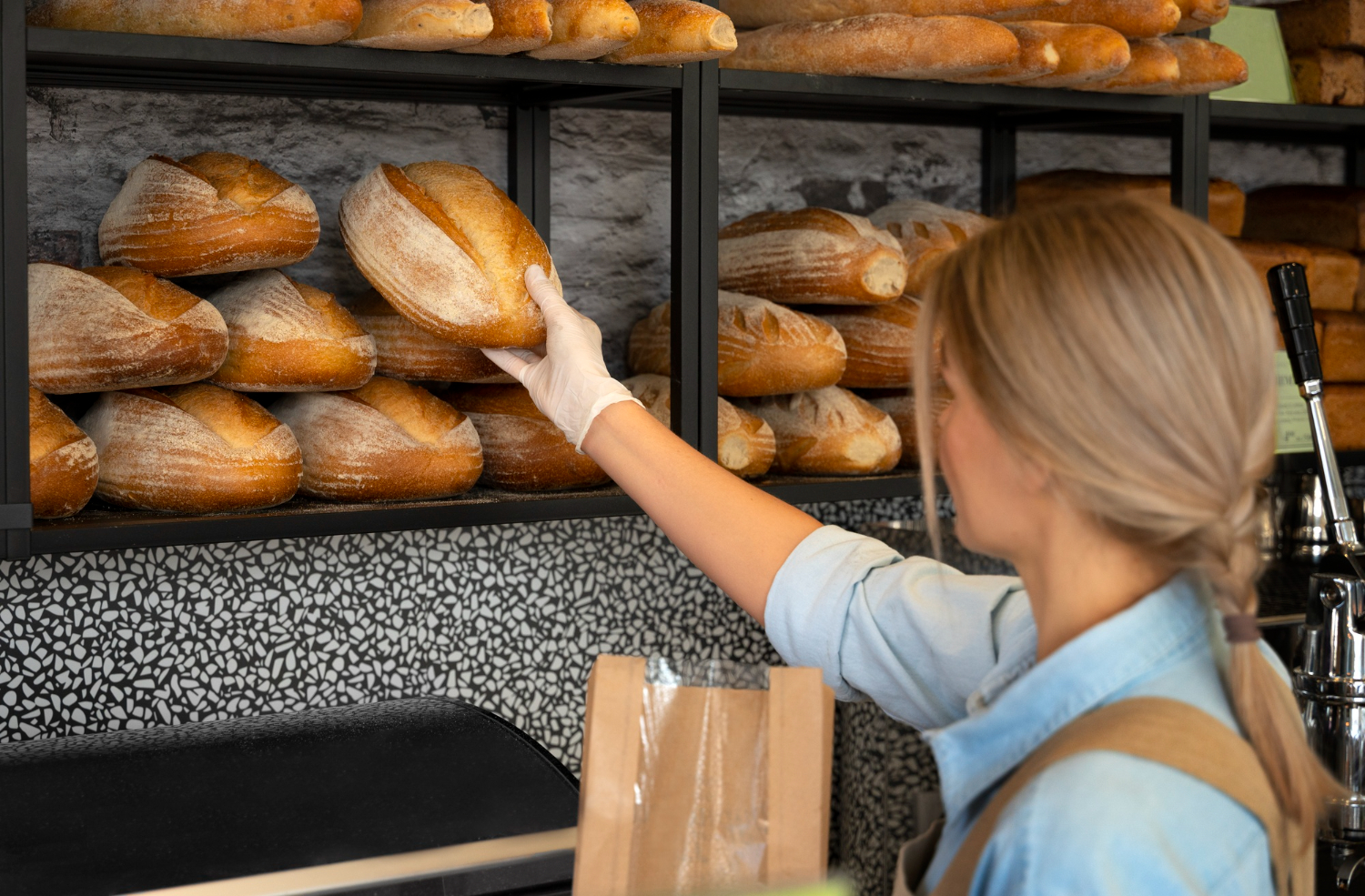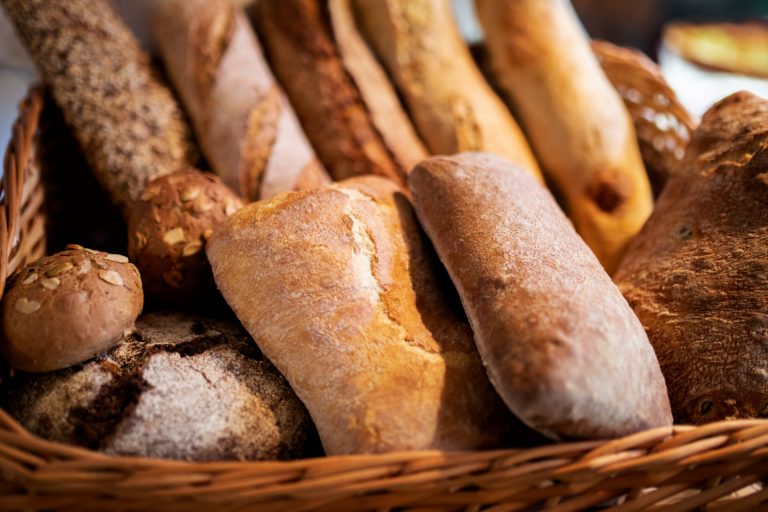How to Create a Business Plan for a Sourdough Bakery: A Step-by-Step Guide
The artisanal bread market has experienced 12% yearly growth since 2020, creating an exciting opportunity for new entrepreneurs. A detailed business plan is a vital first step in launching a successful sourdough operation. Bakery owners can turn their passion for artisanal bread into a viable business venture through this piece.
Readers will discover everything in business planning, from market research to financial projections and operational strategies. The guide teaches SWOT analysis methods, pricing strategies, and ways to build effective sales channels. Practical templates and real-world examples help create professional bakery business plans that attract investors and provide a clear path forward.
Conduct Market Research
A complete picture of market research is the foundation of a successful sourdough bakery business plan. The latest industry data shows exciting growth opportunities in this sector. Business owners need to focus their analysis on three essential areas.
Analyze the Local Sourdough Market
The sourdough market shows the most critical growth potential. The market reached a global valuation of $2.3 billion in 2023, and experts project its expansion to reach a CAGR of 9.1% by 2032. Store-based distribution channels lead the market, especially when you have:
| Distribution Channel | Key Characteristics |
|---|---|
| Specialty Bakeries | High-quality, artisanal products |
| Retail Stores | Wide consumer reach |
| Farmers Markets | Direct consumer interaction |
Identify Your Target Customers
Customer segmentation plays a significant role in shaping product offerings and marketing strategies. The ideal customers for sourdough products are:
- Health-conscious consumers who want natural, organic alternatives
- Professional adults between 35-50 years with disposable income
- Families who value nutritious food choices
- Fitness enthusiasts focused on gut health
- People with mild gluten sensitivities
Market research shows that 72% of consumers believe healthy eating leads to a longer life, and 64% actively think about food’s effect on their health and wellness. These numbers perfectly match sourdough’s natural fermentation process and its health advantages.
Assess Competition
Market analysis shows several exciting dynamics at play. Twenty-year-old bakeries use multiple strategies to keep their market share strong.
Product breakthroughs give businesses a competitive edge. Successful bakeries now sell more than traditional sourdough bread. North American markets show remarkable strength. The sourdough segment hit $700 million in 2023, which is a big deal as it will reach $1.4 billion by 2032.
New market shifts point to a rising need for organic and gluten-free products. New businesses can separate themselves from competitors here. Smart players highlight their unique flavors and health benefits. They also create innovative packaging to solve shelf-life issues.
Instagram and Pinterest have become significant marketing tools. Bakeries use these platforms effectively to display their products and grow their brand. The COVID-19 pandemic pushed the market growth even further. People are more interested in artisanal baking and enjoy bread more at home.
Define Your Sourdough Bakery Concept
Your bakery’s success needs you to think about market positioning, product offerings, and brand identity. A clear business concept helps capture market share effectively. The artisanal bread sector grows as customers are intensely interested in fermented products.
Develop Your Unique Value Proposition
A compelling, unique value proposition (UVP) sets your bakery apart in the competitive marketplace. Your UVP should showcase:
- Traditional fermentation methods creating superior flavor profiles
- Health benefits of properly fermented sourdough
- Expertise in specialty grain varieties
- Steadfast dedication to artisanal craftsmanship
Your bakery’s UVP must align with your target customer’s priorities. It should highlight distinctive qualities that make your business stand out from competitors. This strategic positioning effectively drives all business decisions and marketing efforts.
Outline Your Product Offerings
Product differentiation plays a significant role in the artisanal bread market’s success. A detailed product lineup should include:
| Category | Examples | Key Features |
|---|---|---|
| Signature Loaves | Traditional Sourdough, Rye | Long fermentation, complex flavors |
| Specialty Items | Brioche, Croissants | Sourdough-based laminated doughs |
| Seasonal Products | Holiday Panettone | Limited edition offerings |
| Health-Focused | Ancient Grain Bread | Improved nutritional value |
Your bakery’s steadfast dedication to quality and traditional methods should shine through each product that meets your customers’ needs.
Create Your Brand Identity
A strong brand identity connects customers with bakery products at every point of interaction. Here are the key elements you need:
- Visual Elements
- Professional logo that uses traditional baking symbols
- Consistent color palette showing artisanal quality
- Typography that balances tradition with modernity
Your brand identity should go beyond visual elements to cover the complete customer experience. The store design, packaging, signage, and digital presence play crucial roles. A consistent brand strengthens your market position and builds customer loyalty through:
- Clear messaging on all platforms
- Cohesive visual presentation
- Unified brand voice
- Professional packaging design
The brand book should document all these elements to ensure consistent implementation at all customer touchpoints. This detailed approach to branding helps establish your bakery as a trusted provider of authentic sourdough products and builds strong emotional connections with customers.
Create Financial Projections
Financial projections are the lifeblood of any successful bakery business plan. They give a significant explanation of the venture’s viability and potential profitability. A complete financial forecast helps businesses secure funding and make better operational decisions.
Estimate Startup Costs
Starting a sourdough bakery needs an investment of $70,000 to $250,000. The main startup expenses include:
| Category | Cost Range |
|---|---|
| Equipment | $60,000 – $200,000 |
| Permits/Licenses | $500 – $1,500 |
| Marketing | $300 – $3,000 |
| Contingency Funds | $30,000 |
These numbers show average industry costs that change based on location, size, and business approach. Equipment is the biggest expense in your startup budget. You should consider both new and used equipment options carefully to manage these costs effectively.
Project Revenue and Expenses
Monthly operating expenses make up 75-85% of monthly sales. The main operational costs break down as follows:
- Labor: 24-40% of sales ($2,500 – $10,000)
- Food Costs: 30-35% of sales ($5,000 – $25,000)
- Rent: $1,500 – $10,000
- Utilities: $1,000 – $1,200
- Marketing: 3-6% of sales ($500 – $5,000)
- Insurance: $500 – $8,000
Revenue projections must factor in seasonal changes, special events, and market trends. Artisanal bakeries generate average annual revenue between $325,000 and $450,000. Small operations usually see profit margins of 4% to 9%, while 15-year-old businesses can achieve up to 15% margins.
Develop Cash Flow Forecasts
Your bakery’s cash flow management needs you to focus on three essential components:
Operating Cash Flow
- Daily sales tracking
- Inventory management
- Supplier payment schedules
Investment Cash Flow
- Equipment maintenance and replacement
- Facility improvements
- Technology upgrades
Financing Cash Flow
- Loan repayments
- Interest payments
- Owner distributions
Break-even analysis shows you the sales volume needed to cover costs. Your calculation should include fixed costs, variable costs per unit, and selling price per unit. The math is straightforward: with monthly fixed costs of $2,345.12 and a gross margin per unit of $0.90, you’ll need to sell about 2,606 units monthly to break even.
Bakeries typically become profitable within their first three years. This timeline shifts based on your location, competition, and how well you run your operations. You can track your progress toward financial goals by regularly monitoring key performance indicators (KPIs). These indicators will point out areas that need changes.
Review and update your financial projections quarterly. Use actual performance data to make your forecasts more accurate. This active approach to financial planning helps you make intelligent decisions about pricing, production capacity, and growth opportunities. Remember to keep enough cash reserves for unexpected expenses.
Outline Operations and Management
A sourdough bakery‘s success depends on effectively managing production processes, staffing structure, and supplier relationships. The bakery needs a well-laid-out business plan that details these operational elements and ensures smooth daily operations. This approach guarantees long-term sustainability.
Design Your Production Process
A sourdough bakery’s production process needs precise scheduling and close attention to fermentation timing. Here are the core operational aspects to think over:
| Process Component | Timing | Critical Factors |
|---|---|---|
| Starter Feeding | 6-8 hours before production | Temperature control |
| Bulk Fermentation | 4-24 hours | Ambient conditions |
| Final Proofing | 2-12 hours | Humidity levels |
| Baking Schedule | 3-4 hour cycles | Equipment capacity |
Your choice of equipment will improve production efficiency. New equipment has modern features, but refurbished equipment can save you money. A restored Hobart mixer can save up to $30,000 compared to new models and still delivers reliable performance.
Temperature-controlled proofing chambers and professional-grade ovens are the foundations of solid production infrastructure. Your business plan should list specific equipment needs, maintenance schedules, and backup systems that prevent production stops.
Plan Staffing and Management Structure
A typical retail bakery needs about ten workers in different roles. A proper management structure will result in efficient operations and quality control. These positions are vital to success:
General Manager
- Runs daily operations
- Creates staff schedules
- Follows regulatory requirements
- Takes care of customer relations
Production Manager
- Plan baking schedules
- Upholds quality standards
- Develop production staff
- Controls inventory levels
Front-of-House Staff
- Delivers customer service
- Keeps display cases organized
- Handles transactions
- Takes care of online orders
Staff retention strategies play a significant part in product quality and service excellence. The core team needs competitive pay packages, clear paths to career advancement, and chances to learn new skills. Your business plan should outline specific training programs that include food safety certification and ways to master artisanal baking techniques.
Establish Supplier Relationships
Building strong supplier relationships guarantees steady access to high-quality ingredients your sourdough production needs. Your business plan should specify how to select and manage suppliers:
Primary Ingredients
- Heritage grain sourcing
- Organic certification requirements
- Delivery schedules
- Quality control measures
Secondary Supplies
- Packaging materials
- Cleaning supplies
- Equipment maintenance parts
- Storage solutions
Supply chain management needs resilient tracking systems that control inventory and manage orders. Modern bakery software can automate these processes, reduce errors, and improve efficiency.
Quality control should include regular supplier audits and performance reviews. Your business plan needs clear metrics to evaluate supplier performance:
- Delivery reliability
- Product consistency
- Price stability
- Communication effectiveness
- Problem resolution
Having backup suppliers for critical ingredients helps alleviate supply chain disruptions. Your plan should list strategies that deal with supplier issues, seasonal ingredient availability changes, and unexpected price shifts.
Technology plays a significant role in modern bakery operations. Point-of-sale systems, inventory management software, and production scheduling tools make operations more efficient. Your business plan should map out technology investments and when to implement them.
Monthly reviews of production workflows, staff performance, and supplier relationships optimize operational procedures. Documenting standard operating procedures (SOPs) creates consistency and helps train staff effectively.
Develop Marketing and Sales Strategies
Marketing and sales strategies are the lifeblood of a successful bakery business plan. They determine how well the business connects with its target market. A detailed mix of traditional marketing methods and modern digital strategies helps maximize market reach and sales potential.
Create a Marketing Plan
Your marketing plan needs a monthly budget between $500-$1,000 for promotional activities. A sourdough bakery can thrive using these proven marketing channels:
- Social Media Participation
- Daily posts showing fresh products
- Behind-the-scenes baking process
- Customer testimonials and reviews
- Email Marketing Campaigns
- Monthly newsletters
- Special promotions and seasonal offerings
- Traditional Marketing Methods
- Local print advertising
- Community event participation
- Word-of-mouth referral programs
Sensory marketing is significant for bakery promotion. The aroma of fresh bread can attract people walking by when doors stay open during peak baking times. Strategic sample placement throughout the store boosts purchases by up to 25%.
Outline Sales Channels
A multi-channel sales strategy will give a strong market presence and better revenue results. These are the leading sales channels:
| Channel Type | Revenue Potential | Key Requirements |
|---|---|---|
| Retail Store | 50-55% of sales | Vital location, display design |
| Wholesale | 20% of sales | Reliable delivery system |
| Online Orders | 15-20% of sales | User-friendly platform |
| Farmers Markets | 5-7% of sales | Local permits, portable setup |
Local coffee shops and restaurants can help boost wholesale revenue by 15-20% annually. Online ordering platforms must work with inventory management systems to avoid overselling and keep customers happy.
Set Pricing Strategy
Your pricing strategy needs careful thought about production costs, market positioning, and profit margins. We recommend using a profit index 1.7 to add a 70% margin to the cost price. Here’s what goes into the calculation:
Production costs cover ingredients and labor, while supply costs include packaging and delivery expenses. Rent, utilities, and equipment maintenance make up the fixed costs. Your final pricing structure should keep you competitive and profitable.
Specialty items can fetch premium prices with margins up to 30% higher than standard products. Seasonal adjustments and special promotions need quarterly planning to stay competitive without hurting profit margins.
Loyalty programs boost customer retention by 67%. Repeat customers spend substantially more than new ones. A digital rewards system can track everything automatically and give you valuable customer behavior data that helps future marketing efforts.
FAQs
What are the steps to write a business plan for a small bakery?
To make a business plan for a small bakery, you can get a business plan template. Write an executive summary and conduct a competitive and market analysis. Provide a company overview and describe your products and services. Consider the design and layout of your bakery, prepare a detailed marketing plan, and outline your organizational structure.
Can operating a sourdough bakery be profitable?
Yes, a sourdough bakery can be highly profitable as sourdough products are in demand and have a self-selling appeal.
What initial steps should I take to draft a business plan for a bakery?
When drafting a business plan for a bakery, start by defining its concept and unique selling proposition. Conduct thorough market research and develop your menu and product line. Design your bakery’s layout and operations, create a marketing plan, and plan your financial projections.
What should be included in a bakery business plan?
A bakery business plan should include comprehensive information, starting with an overview of your bakery and its vision. It should detail your target customers, the goods and services you will offer, and your marketing strategies.
Is starting a sourdough bakery a viable business option?
Starting a sourdough bakery can be viable, especially in areas with limited offerings. For instance, there is potential for success in a city with a population of over 350,000 and only one other sourdough provider. To break even, you should sell a minimum number of loaves daily, possibly increasing sales to achieve the desired annual income.






